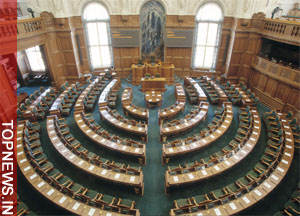Danish parliament organizes hearing on euro
 Copenhagen - European Economic and Monetary Affairs Commissioner Joaquin Almunia and French Finance Minister Christine Lagarde debated the benefits of the joint European currency, the euro, at a Danish parliamentary hearing on Thursday.
Copenhagen - European Economic and Monetary Affairs Commissioner Joaquin Almunia and French Finance Minister Christine Lagarde debated the benefits of the joint European currency, the euro, at a Danish parliamentary hearing on Thursday.
While a long-standing member of the European Union, Denmark has not introduced the euro though the government and main opposition parties are discussing a possible referendum. The hearing was part of that overall process.
Lagarde said the euro and monetary union had contributed to "a higher sense of collective responsibility" among the eurozone members.
She also praised the role of the European Central Bank in efforts to tackle the financial crisis in recent months, saying it had "made use of all measures to alleviate" the crisis.
European Parliament member Daniel Cohn-Bendit said "in the crisis today being together is strength, being alone is dangerous."
Cohn-Bendit, leader of the Greens, cited Britain's financial woes as an example of what could happen when outside the eurozone.
Critical views were presented by Swedish member of parliament Leif Pagrotsky - who served 10 years as cabinet member when the Social Democrats were in power - and Mogens Camre, a member of the European Parliament for the Danish People's Party.
Pagrotsky argued that Sweden, which in 2003 rejected the euro in a referendum, had benefited from its stance with higher growth rates.
Camre said inflation and unemployment had been lower in Britain, Denmark, and Sweden than in the eurozone.
Except on EU matters, Camre's party provides backing for Danish Prime Minister Anders Fogh Rasmussen's minority government.
In his opening remarks, Rasmussen repeated his view that Denmark had less say as a non-member of the eurozone.
The recent financial crisis "showed the financial and political costs of being outside," Rasmussen said, noting that eurozone members have formed a core group.
Denmark joined the EU in 1973, but obtained opt-outs that include security and defence policy, justice and home affairs after voters initially rejected the Maastricht Treaty in a 1992 referendum. (dpa)